Leadership and Management: Employee Development and Solutions
VerifiedAdded on 2022/12/15
|9
|2533
|55
Report
AI Summary
This report delves into the critical aspects of leadership and management, exploring the essential skills required for managers to effectively lead their workforce. It examines technical, conceptual, human, interpersonal, decision-making, and mentoring skills, highlighting their importance in achieving organizational goals. The report emphasizes the significance of employee development, covering topics such as retaining and retraining employees, identifying purpose, overcoming fear factors, building relationships, taking initiatives, and providing training sessions. It also addresses potential issues arising from poor management skills, including employee turnover, misleading information, inefficient resource utilization, demotivation, poor systems, and poor operations management. Furthermore, the report evaluates work situations, recognizes problems, and proposes realistic solutions, such as adapting to change management and scientific management. It applies employee development theories like reinforcement, learning types, experiential learning, and social learning. Finally, the report discusses organizational and individual employee development needs, proposing tailored solutions like Ansoff growth metrics, Porter's generic strategies, PESTLE and SWOT analysis, case studies, game-based training, and simulations. This report provides a thorough analysis of leadership and management principles, offering valuable insights for effective organizational leadership.
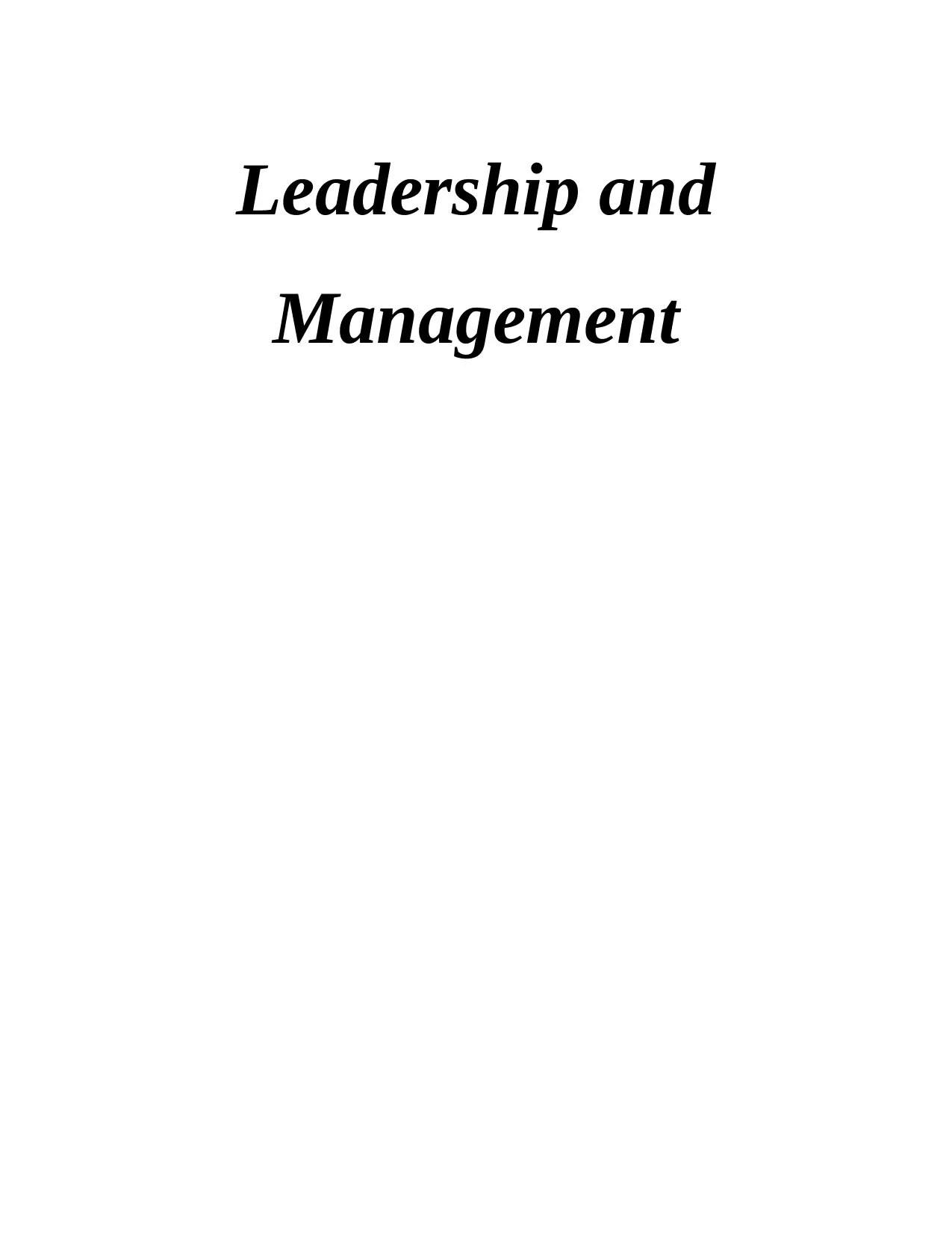
Leadership and
Management
Management
Paraphrase This Document
Need a fresh take? Get an instant paraphrase of this document with our AI Paraphraser
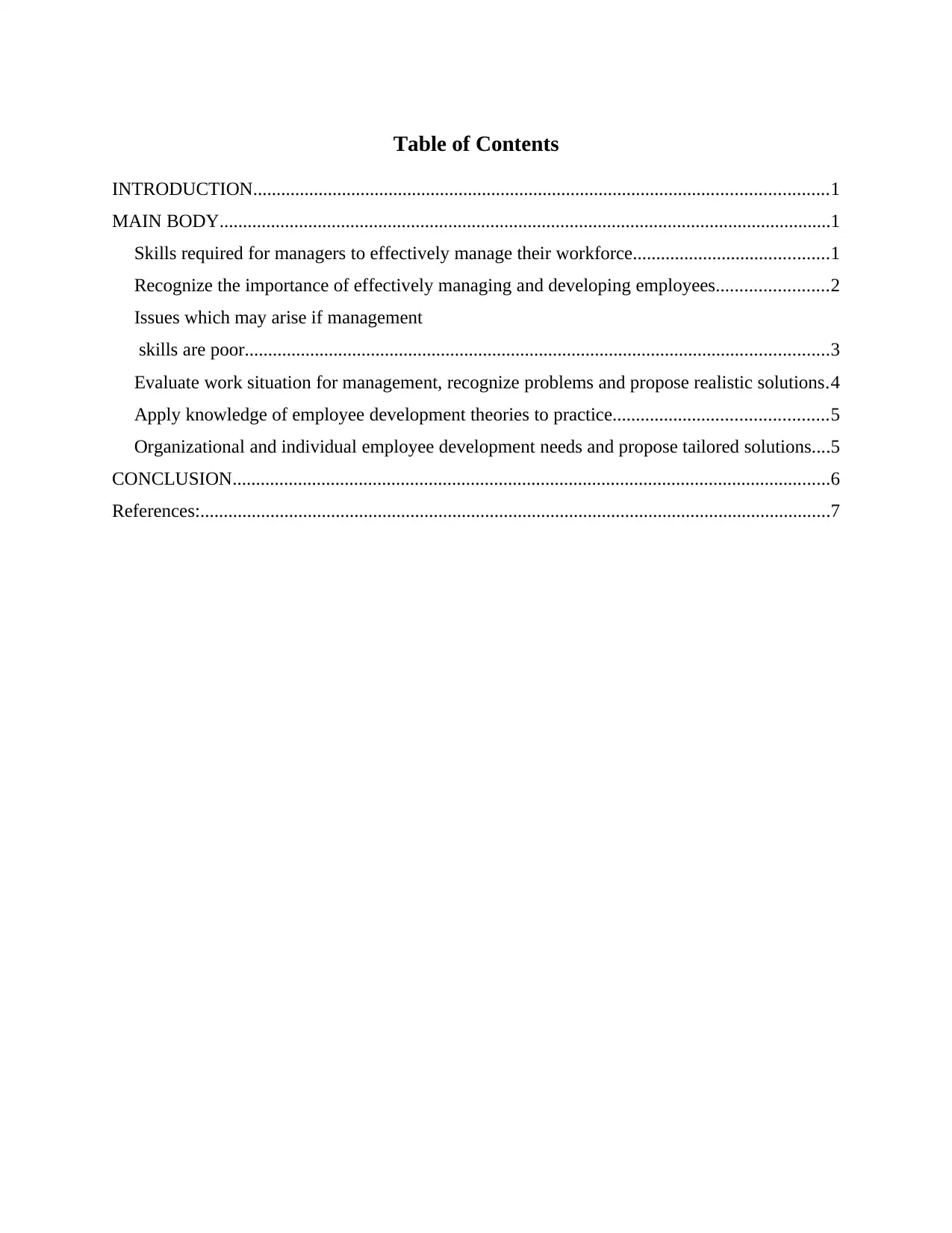
Table of Contents
INTRODUCTION...........................................................................................................................1
MAIN BODY...................................................................................................................................1
Skills required for managers to effectively manage their workforce..........................................1
Recognize the importance of effectively managing and developing employees........................2
Issues which may arise if management
skills are poor.............................................................................................................................3
Evaluate work situation for management, recognize problems and propose realistic solutions.4
Apply knowledge of employee development theories to practice..............................................5
Organizational and individual employee development needs and propose tailored solutions....5
CONCLUSION................................................................................................................................6
References:.......................................................................................................................................7
INTRODUCTION...........................................................................................................................1
MAIN BODY...................................................................................................................................1
Skills required for managers to effectively manage their workforce..........................................1
Recognize the importance of effectively managing and developing employees........................2
Issues which may arise if management
skills are poor.............................................................................................................................3
Evaluate work situation for management, recognize problems and propose realistic solutions.4
Apply knowledge of employee development theories to practice..............................................5
Organizational and individual employee development needs and propose tailored solutions....5
CONCLUSION................................................................................................................................6
References:.......................................................................................................................................7
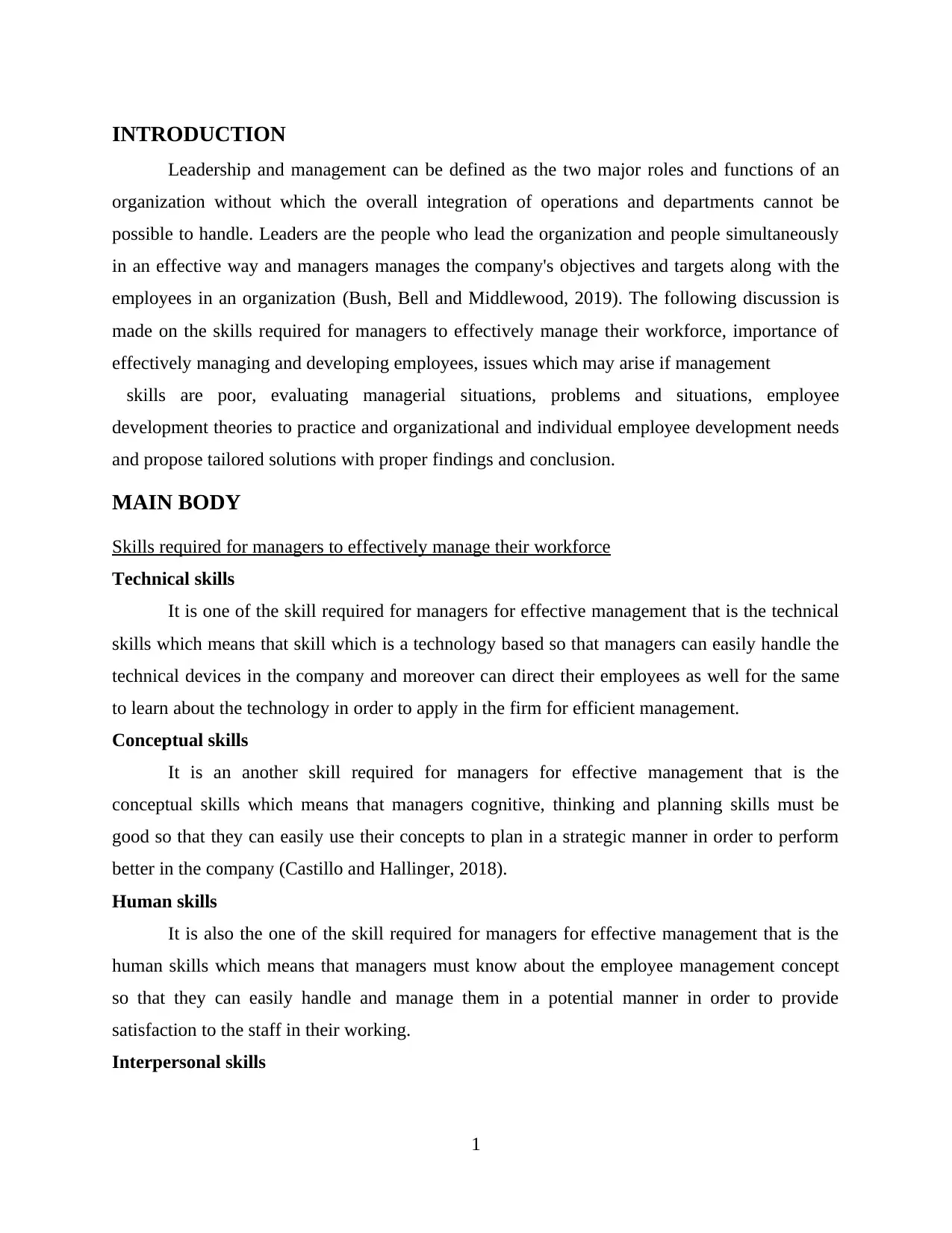
INTRODUCTION
Leadership and management can be defined as the two major roles and functions of an
organization without which the overall integration of operations and departments cannot be
possible to handle. Leaders are the people who lead the organization and people simultaneously
in an effective way and managers manages the company's objectives and targets along with the
employees in an organization (Bush, Bell and Middlewood, 2019). The following discussion is
made on the skills required for managers to effectively manage their workforce, importance of
effectively managing and developing employees, issues which may arise if management
skills are poor, evaluating managerial situations, problems and situations, employee
development theories to practice and organizational and individual employee development needs
and propose tailored solutions with proper findings and conclusion.
MAIN BODY
Skills required for managers to effectively manage their workforce
Technical skills
It is one of the skill required for managers for effective management that is the technical
skills which means that skill which is a technology based so that managers can easily handle the
technical devices in the company and moreover can direct their employees as well for the same
to learn about the technology in order to apply in the firm for efficient management.
Conceptual skills
It is an another skill required for managers for effective management that is the
conceptual skills which means that managers cognitive, thinking and planning skills must be
good so that they can easily use their concepts to plan in a strategic manner in order to perform
better in the company (Castillo and Hallinger, 2018).
Human skills
It is also the one of the skill required for managers for effective management that is the
human skills which means that managers must know about the employee management concept
so that they can easily handle and manage them in a potential manner in order to provide
satisfaction to the staff in their working.
Interpersonal skills
1
Leadership and management can be defined as the two major roles and functions of an
organization without which the overall integration of operations and departments cannot be
possible to handle. Leaders are the people who lead the organization and people simultaneously
in an effective way and managers manages the company's objectives and targets along with the
employees in an organization (Bush, Bell and Middlewood, 2019). The following discussion is
made on the skills required for managers to effectively manage their workforce, importance of
effectively managing and developing employees, issues which may arise if management
skills are poor, evaluating managerial situations, problems and situations, employee
development theories to practice and organizational and individual employee development needs
and propose tailored solutions with proper findings and conclusion.
MAIN BODY
Skills required for managers to effectively manage their workforce
Technical skills
It is one of the skill required for managers for effective management that is the technical
skills which means that skill which is a technology based so that managers can easily handle the
technical devices in the company and moreover can direct their employees as well for the same
to learn about the technology in order to apply in the firm for efficient management.
Conceptual skills
It is an another skill required for managers for effective management that is the
conceptual skills which means that managers cognitive, thinking and planning skills must be
good so that they can easily use their concepts to plan in a strategic manner in order to perform
better in the company (Castillo and Hallinger, 2018).
Human skills
It is also the one of the skill required for managers for effective management that is the
human skills which means that managers must know about the employee management concept
so that they can easily handle and manage them in a potential manner in order to provide
satisfaction to the staff in their working.
Interpersonal skills
1
⊘ This is a preview!⊘
Do you want full access?
Subscribe today to unlock all pages.

Trusted by 1+ million students worldwide
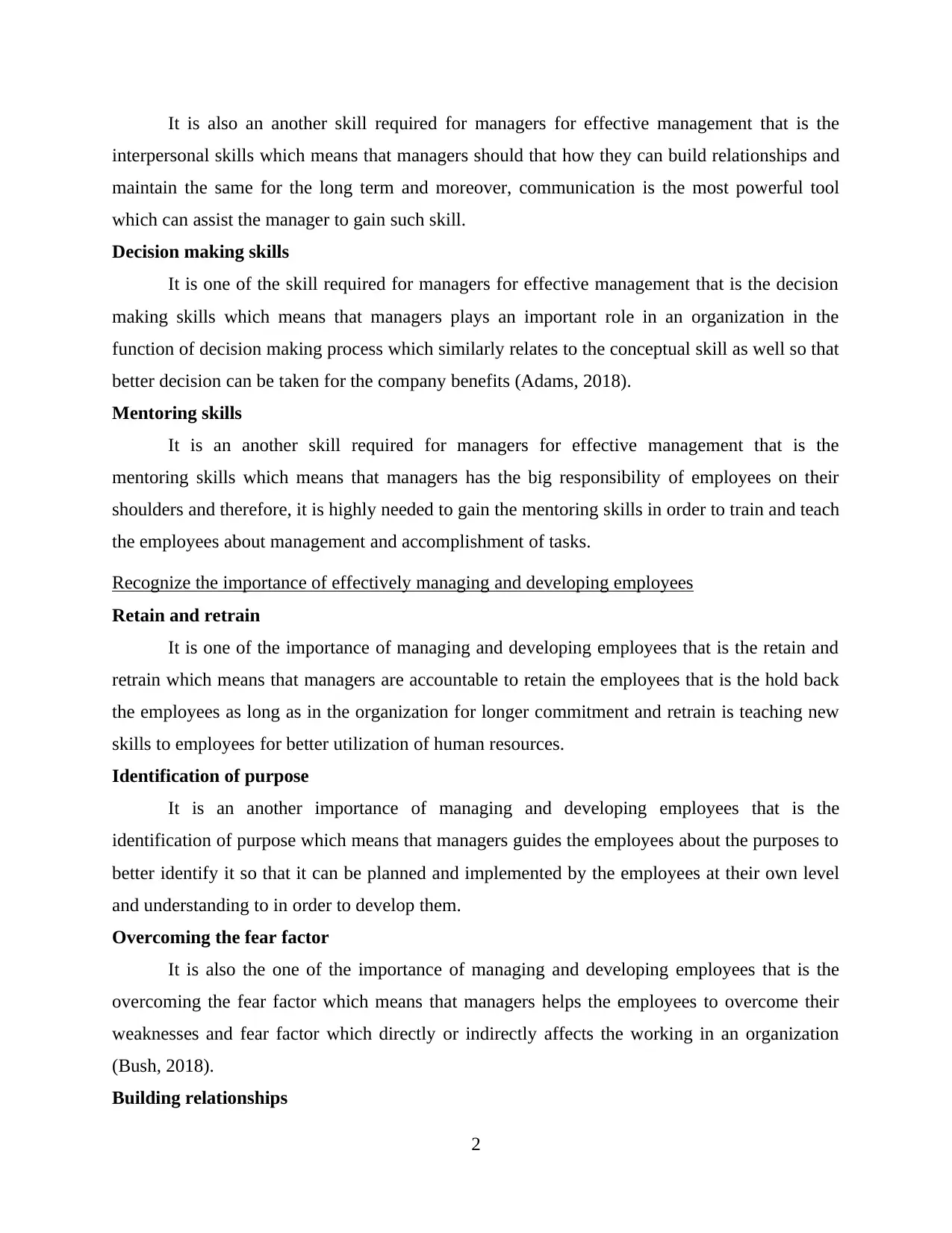
It is also an another skill required for managers for effective management that is the
interpersonal skills which means that managers should that how they can build relationships and
maintain the same for the long term and moreover, communication is the most powerful tool
which can assist the manager to gain such skill.
Decision making skills
It is one of the skill required for managers for effective management that is the decision
making skills which means that managers plays an important role in an organization in the
function of decision making process which similarly relates to the conceptual skill as well so that
better decision can be taken for the company benefits (Adams, 2018).
Mentoring skills
It is an another skill required for managers for effective management that is the
mentoring skills which means that managers has the big responsibility of employees on their
shoulders and therefore, it is highly needed to gain the mentoring skills in order to train and teach
the employees about management and accomplishment of tasks.
Recognize the importance of effectively managing and developing employees
Retain and retrain
It is one of the importance of managing and developing employees that is the retain and
retrain which means that managers are accountable to retain the employees that is the hold back
the employees as long as in the organization for longer commitment and retrain is teaching new
skills to employees for better utilization of human resources.
Identification of purpose
It is an another importance of managing and developing employees that is the
identification of purpose which means that managers guides the employees about the purposes to
better identify it so that it can be planned and implemented by the employees at their own level
and understanding to in order to develop them.
Overcoming the fear factor
It is also the one of the importance of managing and developing employees that is the
overcoming the fear factor which means that managers helps the employees to overcome their
weaknesses and fear factor which directly or indirectly affects the working in an organization
(Bush, 2018).
Building relationships
2
interpersonal skills which means that managers should that how they can build relationships and
maintain the same for the long term and moreover, communication is the most powerful tool
which can assist the manager to gain such skill.
Decision making skills
It is one of the skill required for managers for effective management that is the decision
making skills which means that managers plays an important role in an organization in the
function of decision making process which similarly relates to the conceptual skill as well so that
better decision can be taken for the company benefits (Adams, 2018).
Mentoring skills
It is an another skill required for managers for effective management that is the
mentoring skills which means that managers has the big responsibility of employees on their
shoulders and therefore, it is highly needed to gain the mentoring skills in order to train and teach
the employees about management and accomplishment of tasks.
Recognize the importance of effectively managing and developing employees
Retain and retrain
It is one of the importance of managing and developing employees that is the retain and
retrain which means that managers are accountable to retain the employees that is the hold back
the employees as long as in the organization for longer commitment and retrain is teaching new
skills to employees for better utilization of human resources.
Identification of purpose
It is an another importance of managing and developing employees that is the
identification of purpose which means that managers guides the employees about the purposes to
better identify it so that it can be planned and implemented by the employees at their own level
and understanding to in order to develop them.
Overcoming the fear factor
It is also the one of the importance of managing and developing employees that is the
overcoming the fear factor which means that managers helps the employees to overcome their
weaknesses and fear factor which directly or indirectly affects the working in an organization
(Bush, 2018).
Building relationships
2
Paraphrase This Document
Need a fresh take? Get an instant paraphrase of this document with our AI Paraphraser
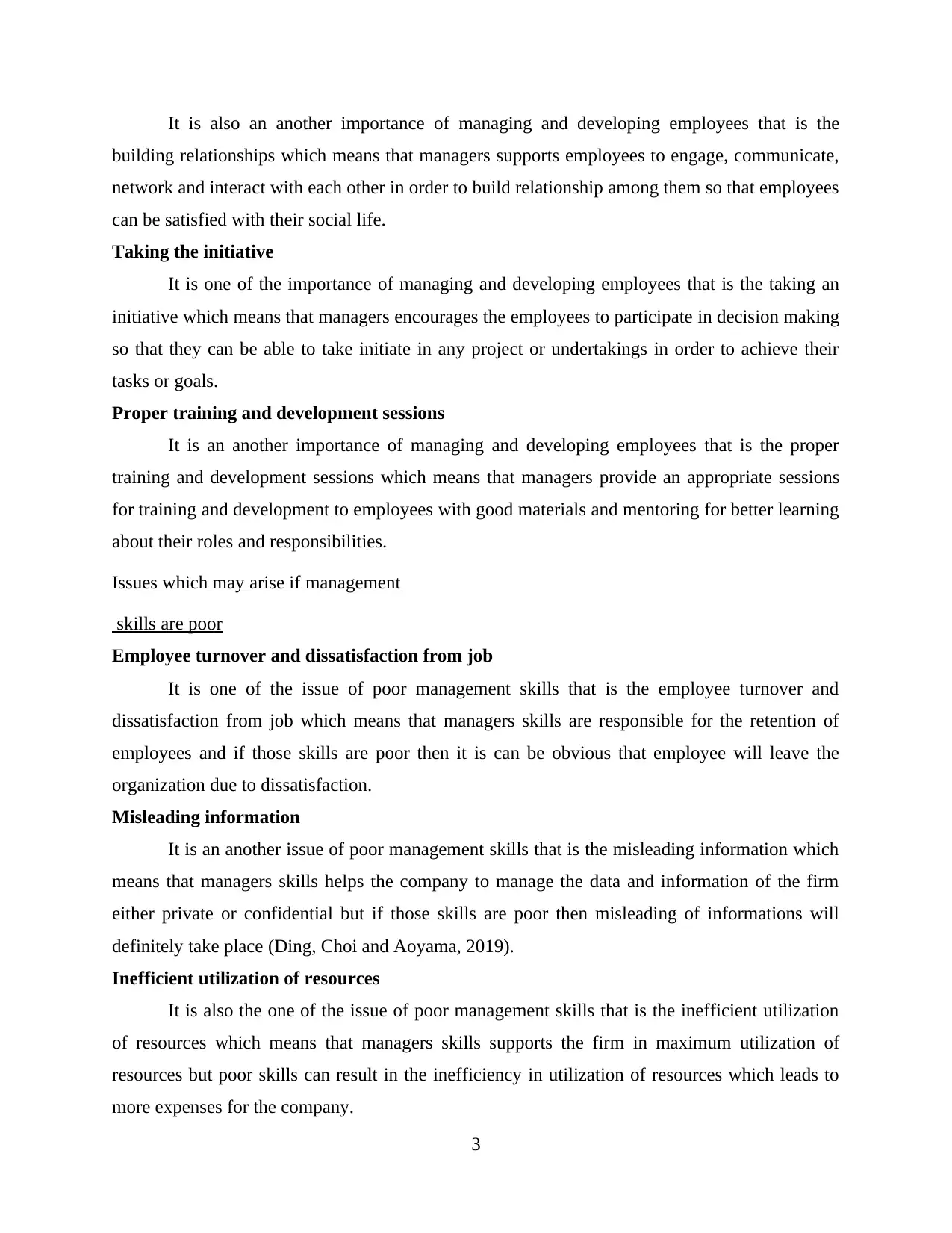
It is also an another importance of managing and developing employees that is the
building relationships which means that managers supports employees to engage, communicate,
network and interact with each other in order to build relationship among them so that employees
can be satisfied with their social life.
Taking the initiative
It is one of the importance of managing and developing employees that is the taking an
initiative which means that managers encourages the employees to participate in decision making
so that they can be able to take initiate in any project or undertakings in order to achieve their
tasks or goals.
Proper training and development sessions
It is an another importance of managing and developing employees that is the proper
training and development sessions which means that managers provide an appropriate sessions
for training and development to employees with good materials and mentoring for better learning
about their roles and responsibilities.
Issues which may arise if management
skills are poor
Employee turnover and dissatisfaction from job
It is one of the issue of poor management skills that is the employee turnover and
dissatisfaction from job which means that managers skills are responsible for the retention of
employees and if those skills are poor then it is can be obvious that employee will leave the
organization due to dissatisfaction.
Misleading information
It is an another issue of poor management skills that is the misleading information which
means that managers skills helps the company to manage the data and information of the firm
either private or confidential but if those skills are poor then misleading of informations will
definitely take place (Ding, Choi and Aoyama, 2019).
Inefficient utilization of resources
It is also the one of the issue of poor management skills that is the inefficient utilization
of resources which means that managers skills supports the firm in maximum utilization of
resources but poor skills can result in the inefficiency in utilization of resources which leads to
more expenses for the company.
3
building relationships which means that managers supports employees to engage, communicate,
network and interact with each other in order to build relationship among them so that employees
can be satisfied with their social life.
Taking the initiative
It is one of the importance of managing and developing employees that is the taking an
initiative which means that managers encourages the employees to participate in decision making
so that they can be able to take initiate in any project or undertakings in order to achieve their
tasks or goals.
Proper training and development sessions
It is an another importance of managing and developing employees that is the proper
training and development sessions which means that managers provide an appropriate sessions
for training and development to employees with good materials and mentoring for better learning
about their roles and responsibilities.
Issues which may arise if management
skills are poor
Employee turnover and dissatisfaction from job
It is one of the issue of poor management skills that is the employee turnover and
dissatisfaction from job which means that managers skills are responsible for the retention of
employees and if those skills are poor then it is can be obvious that employee will leave the
organization due to dissatisfaction.
Misleading information
It is an another issue of poor management skills that is the misleading information which
means that managers skills helps the company to manage the data and information of the firm
either private or confidential but if those skills are poor then misleading of informations will
definitely take place (Ding, Choi and Aoyama, 2019).
Inefficient utilization of resources
It is also the one of the issue of poor management skills that is the inefficient utilization
of resources which means that managers skills supports the firm in maximum utilization of
resources but poor skills can result in the inefficiency in utilization of resources which leads to
more expenses for the company.
3
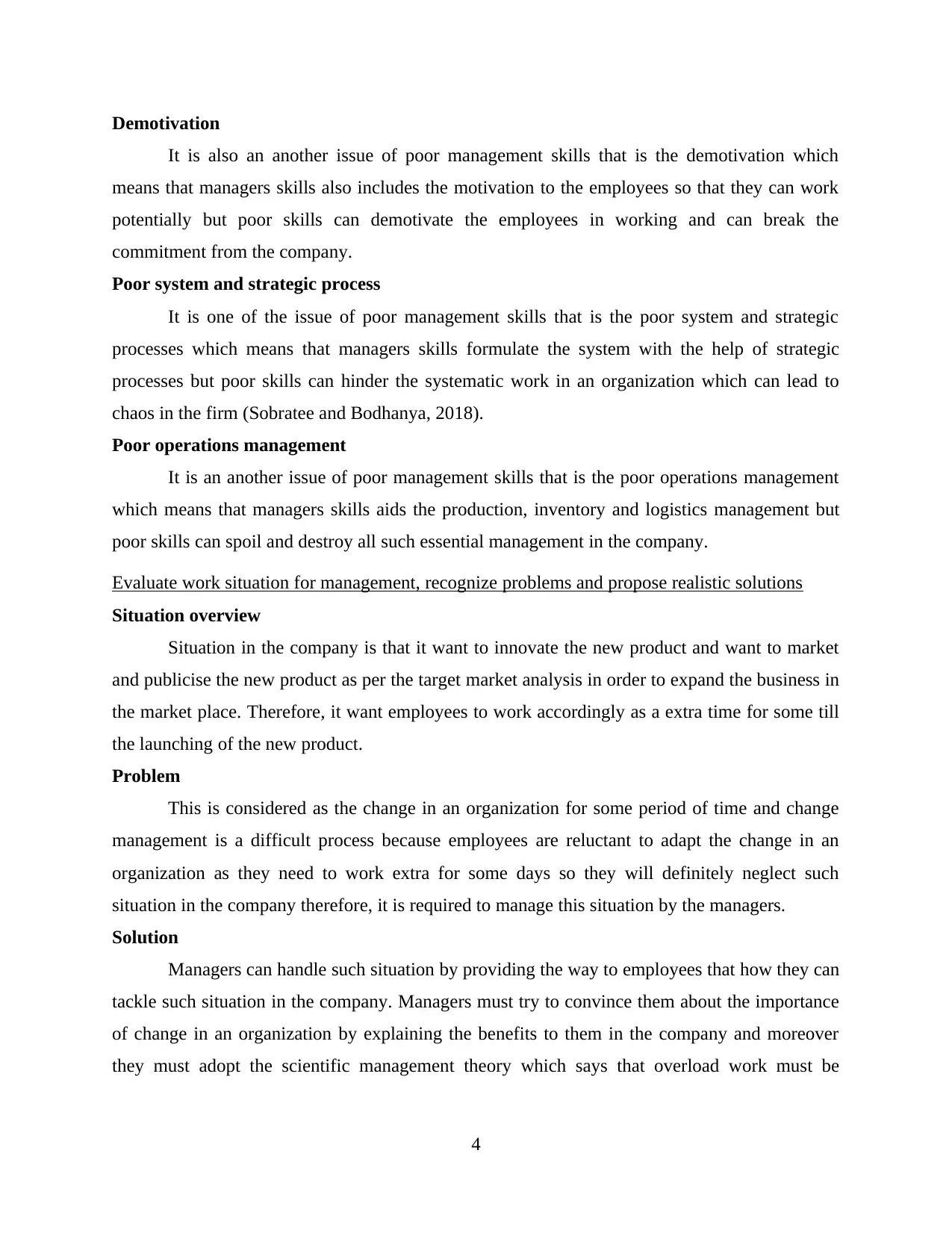
Demotivation
It is also an another issue of poor management skills that is the demotivation which
means that managers skills also includes the motivation to the employees so that they can work
potentially but poor skills can demotivate the employees in working and can break the
commitment from the company.
Poor system and strategic process
It is one of the issue of poor management skills that is the poor system and strategic
processes which means that managers skills formulate the system with the help of strategic
processes but poor skills can hinder the systematic work in an organization which can lead to
chaos in the firm (Sobratee and Bodhanya, 2018).
Poor operations management
It is an another issue of poor management skills that is the poor operations management
which means that managers skills aids the production, inventory and logistics management but
poor skills can spoil and destroy all such essential management in the company.
Evaluate work situation for management, recognize problems and propose realistic solutions
Situation overview
Situation in the company is that it want to innovate the new product and want to market
and publicise the new product as per the target market analysis in order to expand the business in
the market place. Therefore, it want employees to work accordingly as a extra time for some till
the launching of the new product.
Problem
This is considered as the change in an organization for some period of time and change
management is a difficult process because employees are reluctant to adapt the change in an
organization as they need to work extra for some days so they will definitely neglect such
situation in the company therefore, it is required to manage this situation by the managers.
Solution
Managers can handle such situation by providing the way to employees that how they can
tackle such situation in the company. Managers must try to convince them about the importance
of change in an organization by explaining the benefits to them in the company and moreover
they must adopt the scientific management theory which says that overload work must be
4
It is also an another issue of poor management skills that is the demotivation which
means that managers skills also includes the motivation to the employees so that they can work
potentially but poor skills can demotivate the employees in working and can break the
commitment from the company.
Poor system and strategic process
It is one of the issue of poor management skills that is the poor system and strategic
processes which means that managers skills formulate the system with the help of strategic
processes but poor skills can hinder the systematic work in an organization which can lead to
chaos in the firm (Sobratee and Bodhanya, 2018).
Poor operations management
It is an another issue of poor management skills that is the poor operations management
which means that managers skills aids the production, inventory and logistics management but
poor skills can spoil and destroy all such essential management in the company.
Evaluate work situation for management, recognize problems and propose realistic solutions
Situation overview
Situation in the company is that it want to innovate the new product and want to market
and publicise the new product as per the target market analysis in order to expand the business in
the market place. Therefore, it want employees to work accordingly as a extra time for some till
the launching of the new product.
Problem
This is considered as the change in an organization for some period of time and change
management is a difficult process because employees are reluctant to adapt the change in an
organization as they need to work extra for some days so they will definitely neglect such
situation in the company therefore, it is required to manage this situation by the managers.
Solution
Managers can handle such situation by providing the way to employees that how they can
tackle such situation in the company. Managers must try to convince them about the importance
of change in an organization by explaining the benefits to them in the company and moreover
they must adopt the scientific management theory which says that overload work must be
4
⊘ This is a preview!⊘
Do you want full access?
Subscribe today to unlock all pages.

Trusted by 1+ million students worldwide
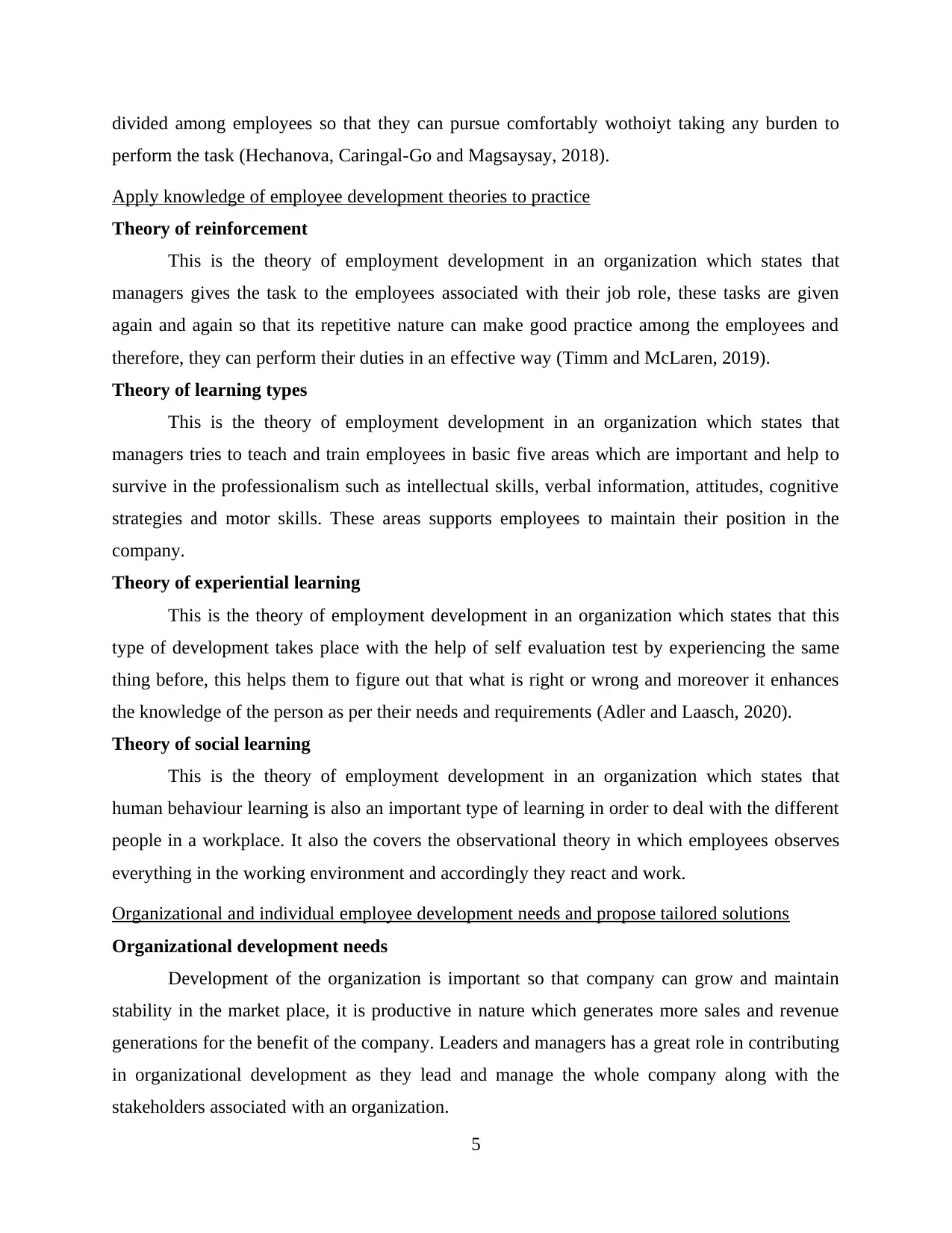
divided among employees so that they can pursue comfortably wothoiyt taking any burden to
perform the task (Hechanova, Caringal-Go and Magsaysay, 2018).
Apply knowledge of employee development theories to practice
Theory of reinforcement
This is the theory of employment development in an organization which states that
managers gives the task to the employees associated with their job role, these tasks are given
again and again so that its repetitive nature can make good practice among the employees and
therefore, they can perform their duties in an effective way (Timm and McLaren, 2019).
Theory of learning types
This is the theory of employment development in an organization which states that
managers tries to teach and train employees in basic five areas which are important and help to
survive in the professionalism such as intellectual skills, verbal information, attitudes, cognitive
strategies and motor skills. These areas supports employees to maintain their position in the
company.
Theory of experiential learning
This is the theory of employment development in an organization which states that this
type of development takes place with the help of self evaluation test by experiencing the same
thing before, this helps them to figure out that what is right or wrong and moreover it enhances
the knowledge of the person as per their needs and requirements (Adler and Laasch, 2020).
Theory of social learning
This is the theory of employment development in an organization which states that
human behaviour learning is also an important type of learning in order to deal with the different
people in a workplace. It also the covers the observational theory in which employees observes
everything in the working environment and accordingly they react and work.
Organizational and individual employee development needs and propose tailored solutions
Organizational development needs
Development of the organization is important so that company can grow and maintain
stability in the market place, it is productive in nature which generates more sales and revenue
generations for the benefit of the company. Leaders and managers has a great role in contributing
in organizational development as they lead and manage the whole company along with the
stakeholders associated with an organization.
5
perform the task (Hechanova, Caringal-Go and Magsaysay, 2018).
Apply knowledge of employee development theories to practice
Theory of reinforcement
This is the theory of employment development in an organization which states that
managers gives the task to the employees associated with their job role, these tasks are given
again and again so that its repetitive nature can make good practice among the employees and
therefore, they can perform their duties in an effective way (Timm and McLaren, 2019).
Theory of learning types
This is the theory of employment development in an organization which states that
managers tries to teach and train employees in basic five areas which are important and help to
survive in the professionalism such as intellectual skills, verbal information, attitudes, cognitive
strategies and motor skills. These areas supports employees to maintain their position in the
company.
Theory of experiential learning
This is the theory of employment development in an organization which states that this
type of development takes place with the help of self evaluation test by experiencing the same
thing before, this helps them to figure out that what is right or wrong and moreover it enhances
the knowledge of the person as per their needs and requirements (Adler and Laasch, 2020).
Theory of social learning
This is the theory of employment development in an organization which states that
human behaviour learning is also an important type of learning in order to deal with the different
people in a workplace. It also the covers the observational theory in which employees observes
everything in the working environment and accordingly they react and work.
Organizational and individual employee development needs and propose tailored solutions
Organizational development needs
Development of the organization is important so that company can grow and maintain
stability in the market place, it is productive in nature which generates more sales and revenue
generations for the benefit of the company. Leaders and managers has a great role in contributing
in organizational development as they lead and manage the whole company along with the
stakeholders associated with an organization.
5
Paraphrase This Document
Need a fresh take? Get an instant paraphrase of this document with our AI Paraphraser
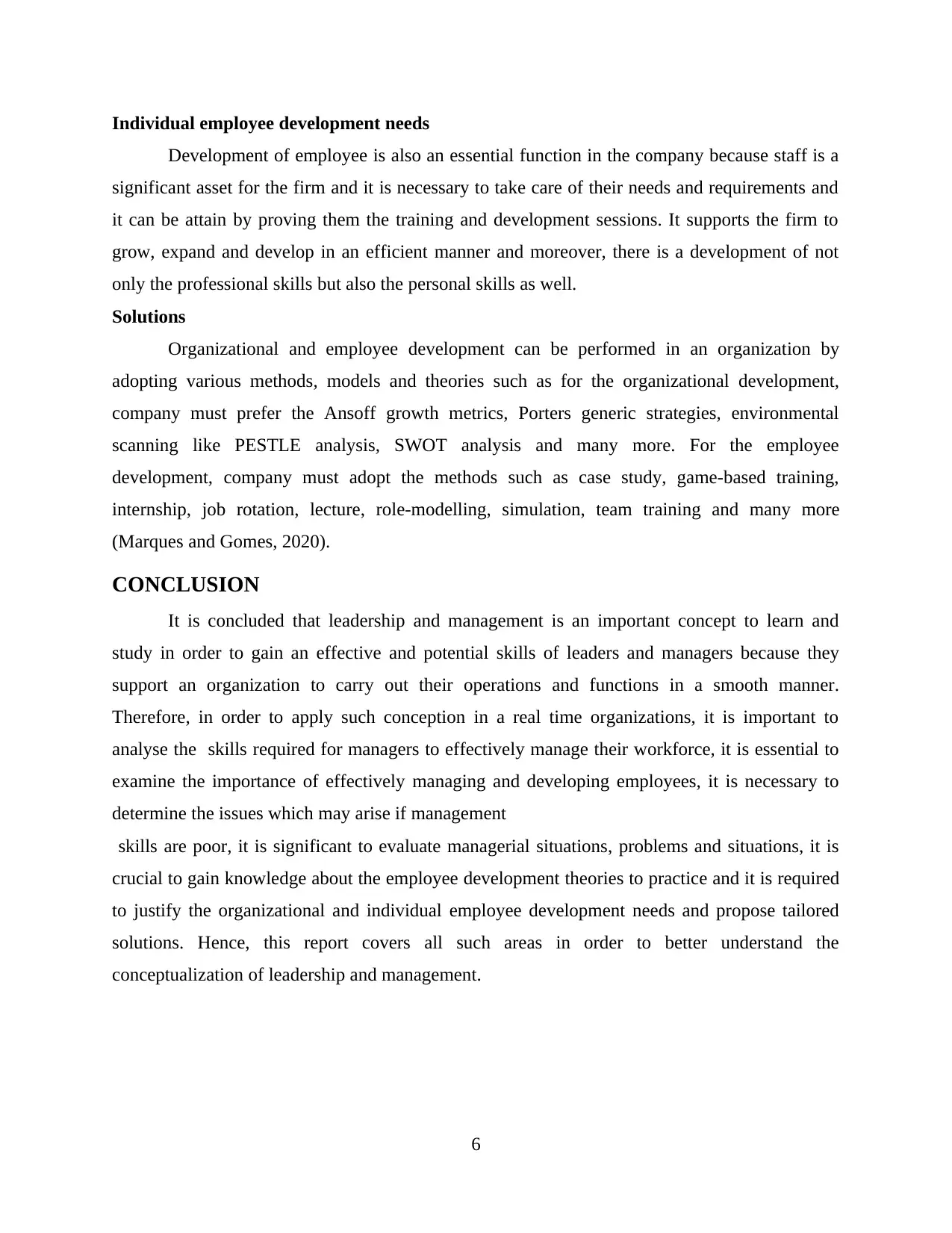
Individual employee development needs
Development of employee is also an essential function in the company because staff is a
significant asset for the firm and it is necessary to take care of their needs and requirements and
it can be attain by proving them the training and development sessions. It supports the firm to
grow, expand and develop in an efficient manner and moreover, there is a development of not
only the professional skills but also the personal skills as well.
Solutions
Organizational and employee development can be performed in an organization by
adopting various methods, models and theories such as for the organizational development,
company must prefer the Ansoff growth metrics, Porters generic strategies, environmental
scanning like PESTLE analysis, SWOT analysis and many more. For the employee
development, company must adopt the methods such as case study, game-based training,
internship, job rotation, lecture, role-modelling, simulation, team training and many more
(Marques and Gomes, 2020).
CONCLUSION
It is concluded that leadership and management is an important concept to learn and
study in order to gain an effective and potential skills of leaders and managers because they
support an organization to carry out their operations and functions in a smooth manner.
Therefore, in order to apply such conception in a real time organizations, it is important to
analyse the skills required for managers to effectively manage their workforce, it is essential to
examine the importance of effectively managing and developing employees, it is necessary to
determine the issues which may arise if management
skills are poor, it is significant to evaluate managerial situations, problems and situations, it is
crucial to gain knowledge about the employee development theories to practice and it is required
to justify the organizational and individual employee development needs and propose tailored
solutions. Hence, this report covers all such areas in order to better understand the
conceptualization of leadership and management.
6
Development of employee is also an essential function in the company because staff is a
significant asset for the firm and it is necessary to take care of their needs and requirements and
it can be attain by proving them the training and development sessions. It supports the firm to
grow, expand and develop in an efficient manner and moreover, there is a development of not
only the professional skills but also the personal skills as well.
Solutions
Organizational and employee development can be performed in an organization by
adopting various methods, models and theories such as for the organizational development,
company must prefer the Ansoff growth metrics, Porters generic strategies, environmental
scanning like PESTLE analysis, SWOT analysis and many more. For the employee
development, company must adopt the methods such as case study, game-based training,
internship, job rotation, lecture, role-modelling, simulation, team training and many more
(Marques and Gomes, 2020).
CONCLUSION
It is concluded that leadership and management is an important concept to learn and
study in order to gain an effective and potential skills of leaders and managers because they
support an organization to carry out their operations and functions in a smooth manner.
Therefore, in order to apply such conception in a real time organizations, it is important to
analyse the skills required for managers to effectively manage their workforce, it is essential to
examine the importance of effectively managing and developing employees, it is necessary to
determine the issues which may arise if management
skills are poor, it is significant to evaluate managerial situations, problems and situations, it is
crucial to gain knowledge about the employee development theories to practice and it is required
to justify the organizational and individual employee development needs and propose tailored
solutions. Hence, this report covers all such areas in order to better understand the
conceptualization of leadership and management.
6
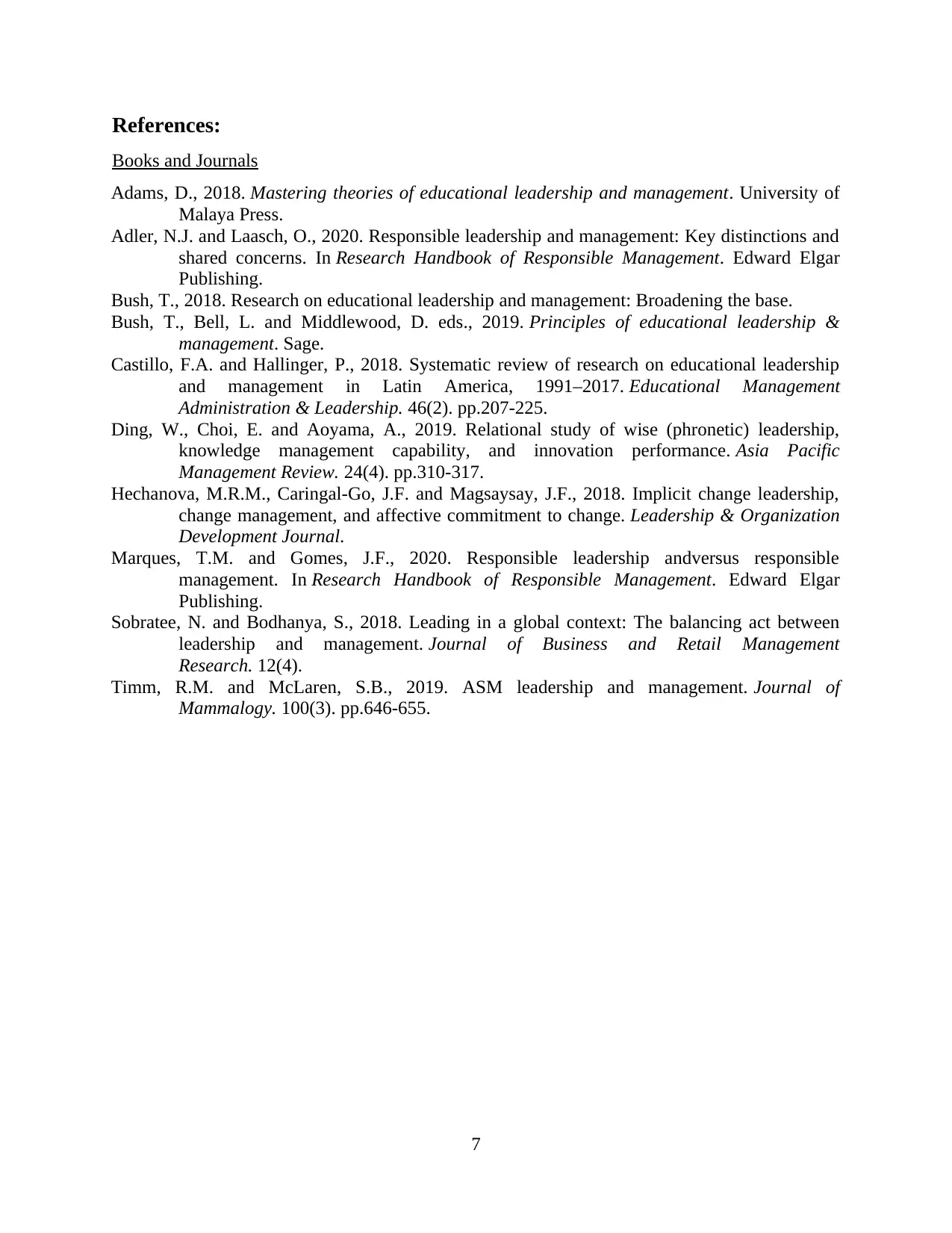
References:
Books and Journals
Adams, D., 2018. Mastering theories of educational leadership and management. University of
Malaya Press.
Adler, N.J. and Laasch, O., 2020. Responsible leadership and management: Key distinctions and
shared concerns. In Research Handbook of Responsible Management. Edward Elgar
Publishing.
Bush, T., 2018. Research on educational leadership and management: Broadening the base.
Bush, T., Bell, L. and Middlewood, D. eds., 2019. Principles of educational leadership &
management. Sage.
Castillo, F.A. and Hallinger, P., 2018. Systematic review of research on educational leadership
and management in Latin America, 1991–2017. Educational Management
Administration & Leadership. 46(2). pp.207-225.
Ding, W., Choi, E. and Aoyama, A., 2019. Relational study of wise (phronetic) leadership,
knowledge management capability, and innovation performance. Asia Pacific
Management Review. 24(4). pp.310-317.
Hechanova, M.R.M., Caringal-Go, J.F. and Magsaysay, J.F., 2018. Implicit change leadership,
change management, and affective commitment to change. Leadership & Organization
Development Journal.
Marques, T.M. and Gomes, J.F., 2020. Responsible leadership andversus responsible
management. In Research Handbook of Responsible Management. Edward Elgar
Publishing.
Sobratee, N. and Bodhanya, S., 2018. Leading in a global context: The balancing act between
leadership and management. Journal of Business and Retail Management
Research. 12(4).
Timm, R.M. and McLaren, S.B., 2019. ASM leadership and management. Journal of
Mammalogy. 100(3). pp.646-655.
7
Books and Journals
Adams, D., 2018. Mastering theories of educational leadership and management. University of
Malaya Press.
Adler, N.J. and Laasch, O., 2020. Responsible leadership and management: Key distinctions and
shared concerns. In Research Handbook of Responsible Management. Edward Elgar
Publishing.
Bush, T., 2018. Research on educational leadership and management: Broadening the base.
Bush, T., Bell, L. and Middlewood, D. eds., 2019. Principles of educational leadership &
management. Sage.
Castillo, F.A. and Hallinger, P., 2018. Systematic review of research on educational leadership
and management in Latin America, 1991–2017. Educational Management
Administration & Leadership. 46(2). pp.207-225.
Ding, W., Choi, E. and Aoyama, A., 2019. Relational study of wise (phronetic) leadership,
knowledge management capability, and innovation performance. Asia Pacific
Management Review. 24(4). pp.310-317.
Hechanova, M.R.M., Caringal-Go, J.F. and Magsaysay, J.F., 2018. Implicit change leadership,
change management, and affective commitment to change. Leadership & Organization
Development Journal.
Marques, T.M. and Gomes, J.F., 2020. Responsible leadership andversus responsible
management. In Research Handbook of Responsible Management. Edward Elgar
Publishing.
Sobratee, N. and Bodhanya, S., 2018. Leading in a global context: The balancing act between
leadership and management. Journal of Business and Retail Management
Research. 12(4).
Timm, R.M. and McLaren, S.B., 2019. ASM leadership and management. Journal of
Mammalogy. 100(3). pp.646-655.
7
⊘ This is a preview!⊘
Do you want full access?
Subscribe today to unlock all pages.

Trusted by 1+ million students worldwide
1 out of 9
Related Documents
Your All-in-One AI-Powered Toolkit for Academic Success.
+13062052269
info@desklib.com
Available 24*7 on WhatsApp / Email
![[object Object]](/_next/static/media/star-bottom.7253800d.svg)
Unlock your academic potential
Copyright © 2020–2026 A2Z Services. All Rights Reserved. Developed and managed by ZUCOL.





